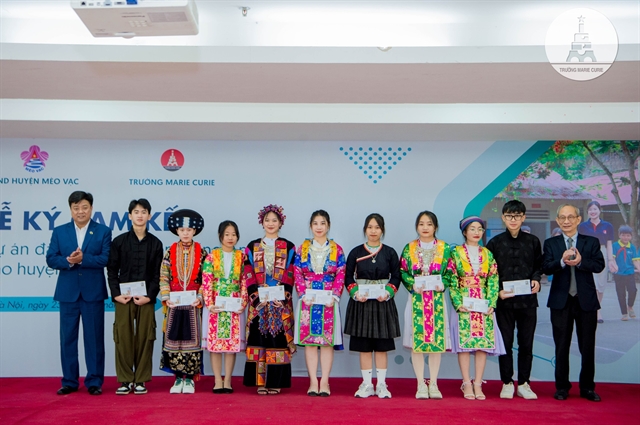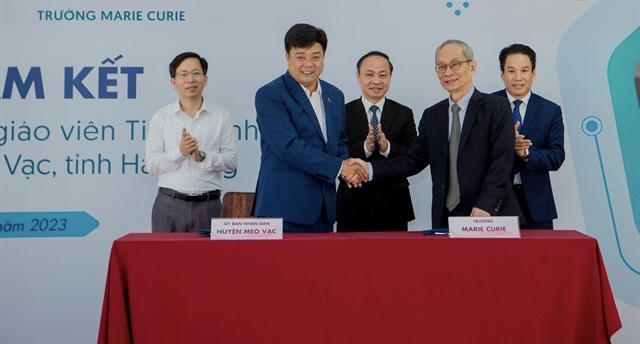The shortage of English teachers in localities, especially in mountainous and remote areas, remains a persistent and challenging issue for the education sector.
Deeply concerned about the severe shortage of English teachers in the ethnic minority-dominant Mèo Vạc District in the northern mountainous province of Hà Giang, at the beginning of the 2023-24 academic year, Nguyễn Xuân Khang, the Principal of Marie Curie School in Hà Nội, proposed to the leaders of Mèo Vạc District establishing a project to train 30 local teachers, the Voice of Việt Nam reported.
The local People’s Committee will select outstanding students who have the desire to become English teachers and send them to study English at universities.
These teachers will be appointed to teach English to students in the locality after graduation.
Over the four years of university education, Marie Curie School will provide scholarships for the 30 students to cover their living expenses and study materials. The project aims to create a stable and long-term source of English teachers for Mèo Vạc District, addressing the root issue of the teacher shortage.
In the commitment agreement signed on November 25 between Hà Giang Province and the school, the minimum scholarship amount for each student is VNĐ5 million (US$206) per student per month.
“The scholarship can increase to VNĐ6-10 million per student per month if their study performance in this semester is good, and even higher in the next semester. The estimated budget for training 30 local teachers is from VNĐ6 to VNĐ12 billion,” Khang said.
“We hope that with this budget, the school can help students with living expenses, accommodation and education throughout the four years of university.”
The first group of students in the project, including nine students at universities of Education and English Language in Hà Nội and Thái Nguyên Province, received the first month’s scholarship after the signing ceremony.
The 2022-2023 school year is the first year of the new general education programme under which third grade students across the country begin to study English and information technology, deputy chairman of Mèo Vạc District People’s Committee Ngô Mạnh Cường said.
However, the district is facing a severe shortage of English teachers. The district has 158 second-grade classes with 2,609 students, but only one primary school English teacher.
To address this challenge, Marie Curie School has assisted the district in implementing online English classes for third-grade students.
In this arrangement, Marie Curie School teaches three sessions per week, while the district directly provides one session per week.
At the beginning of this project, Marie Curie School recruited teachers, and Mèo Vạc District promptly supplemented the necessary facilities for teaching and learning.
By the end of the 2022-23 academic year, 22 teachers from Marie Curie School had completed online English teaching for 2,609 third-grade students and continue to teach them as they enter fourth and fifth grades in the 2023-2024 school year.
Thanks to the ripple effect of Marie Curie School’s English teaching project, this year Mèo Vạc District continues to receive support from the Department of Education and Training of Lâm Đồng Province for 16 teachers conducting 16 classes in four schools in the district.
In addition, the volunteer group “Những bước chân xanh” (Green Steps) from HCM City also provides teachers for 48 classes.
Although Marie Curie School’s project has temporarily addressed the shortage of teachers, Cường emphasised that in the long term, it is necessary to train local people to become teachers.
The district now has 24 English teachers for secondary schools and three for primary schools.
To meet the teaching and learning needs, about 40 more English teachers need to be recruited and trained.
The district has conducted two rounds of teacher recruitment for English, with two teachers selected in the first round and one in the second round.
In the near future, Mèo Vạc District will have a total of four primary school English teachers and 24 secondary school English teachers.
 |
| The first nine students of the project receive the first month’s scholarship after the signing ceremony. |
However, according to the implementation of the 2018 general education programme, the demand for English teachers is expected to be much higher, Cường said.
“In the coming time, we expect a continued shortage of English teachers due to the increase in the number of students.
“Some English teachers transfer to more convenient areas, and the number of local students majoring in English is low due to economic constraints in many families. Some graduates may not want to return to their hometowns for work,” Cường said.
With the Marie Curie School’s project, students now have financial support and they do not need to worry about earning money for living expenses.
Principal Khang emphasised that the training of 30 teachers would essentially address the persistent shortage of English teachers in Mèo Vạc District.
“We hope to see our initiative create a ripple effect, inspiring other enterprises to join in. The shortage of English teachers, in particular, and teachers for various subjects in general, in localities, especially in remote and mountainous areas, will be addressed,” said Cường.
Chảo Thị Xuân, an English student from the Faculty of Language and Culture, Thái Nguyên University, is happy to receive the scholarship.
Xuân is the seventh child in a family of nine siblings.
Each month, Xuân’s older sister, who is currently a preschool teacher in Mèo Vạc District, provides VNĐ2 million to cover Xuân’s study and living expenses.
“The scholarship will bring peace of mind for me in my studies, and my sister will no longer have to pay for my education. Once I finish my studies, I am determined to return to our hometown and contribute to education,” Xuân said.
Nguyễn Quang Huy, a first-year student at Hà Nội Pedagogical University, stands among the pioneering participants in the project. During his secondary school years, Huy developed his English reading, writing and listening skills independently.
However, limited opportunities for practicing speaking in Hà Giang hampered his oral proficiency. He turned to online resources, utilising self-sourced materials and engaging in conversations with tourists.
Entering high school, Huy was given the opportunity to go to Hà Nội to study. He encountered many friends proficient in English, fostering a supportive environment where they collaborated in seeking self-learning materials.
As a result, Huy successfully entered Hà Nội Pedagogical University with a score of 26.86.
“Even before discovering this program, I had already considered returning to the province to teach because there is a shortage of English teachers there. It is also a job that I feel suits me well in the future.”
“The scholarship has significant value in terms of motivation. I have promised myself to study well, achieve good results, and return to the province to teach students.”
Source: Vietnam News


